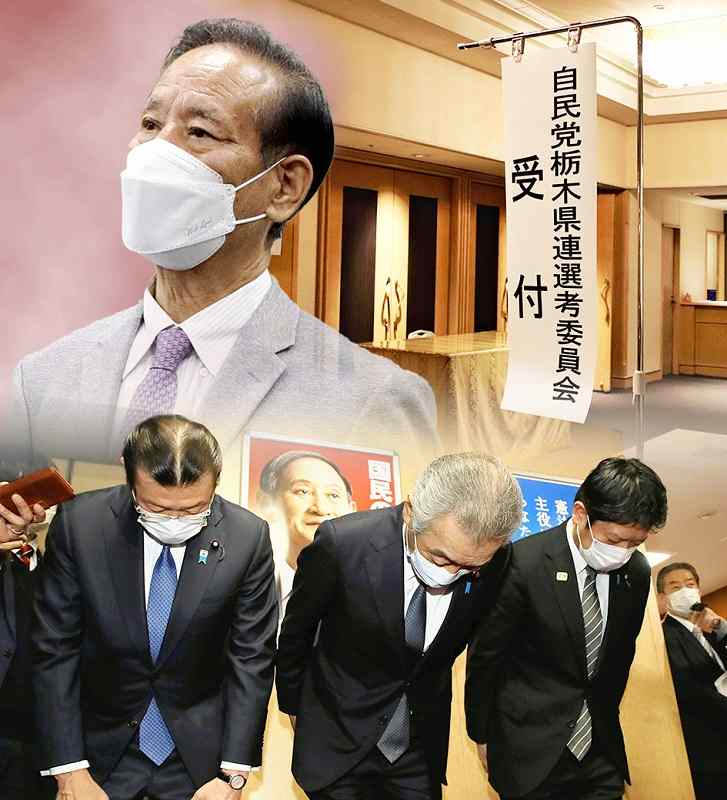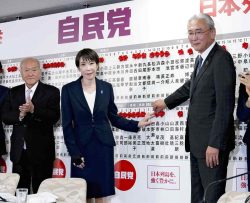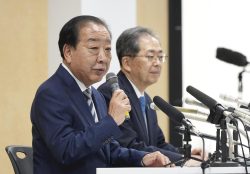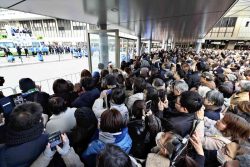
An artist illustration:
Clockwise from upper left: Koya Nishikawa; reception desk of the LDP’s Tochigi prefectural federation’s committee for selection of candidates; three then LDP lawmakers — from left, Takashi Otsuka, Jun Matsumoto and Taido Tanose — apologize after submitting their party resignations on Feb. 1.
14:30 JST, August 17, 2021
Japan’s political parties are making preparations for the House of Representatives election that must be held by autumn. The ruling coalition of the Liberal Democratic Party and Komeito face several internal issues, while the opposition parties search for ways to win more lower house seats. Amid all this, the LDP must also deal with an intraparty presidential vote involving Prime Minister Yoshihide Suga.
This series, Backstories to General Election, is appearing exclusively online on The Japan News. Information is accurate as of the time the series was originally printed in Japanese in The Yomiuri Shimbun in July.
***
The Liberal Democratic Party faces difficult choices about how to deal with incumbent and former party lawmakers. The party is in a dilemma over whether it should strictly adhere to principles or show understanding for the wishes of LDP bigwigs.
On the evening of July 7, former Agriculture, Forestry and Fisheries Minister Koya Nishikawa arrived at LDP headquarters and visited senior members, including Secretary General Toshihiro Nikai.
Nishikawa, who has announced his intention not to run in the next House of Representatives election, has been working hard to have his eldest son be allowed to run in the election for the seat he once held from Tochigi Constituency No. 2.
“Do your best,” Nikai told him.
Nishikawa once served as chief of the secretariat of Nikai’s faction in the LDP. He is still a member of the faction, even though he lost his Diet seat in the 2017 lower house election.
In December last year, Nishikawa was forced to resign from the post of adviser to the Cabinet Secretariat due to allegations he had received bribes from the head of Akita Foods, a major egg production company.
Though Nishikawa has been tainted by the money-in-politics scandal, he has been acting confidently with the backing of the Nikai faction.
In an open recruitment of candidates for election organized by the LDP’s Tochigi prefectural federation, 15 people made their bids. Among them was Nishikawa’s eldest son, Yasuo who is a Tochigi prefectural assembly member.
On June 2, the recruitment selection committee nominated Kiyoshi Igarashi, then a Tochigi prefectural assembly member, as the candidate for the seat Nishikawa once held, from among four people who passed the final selection screening. Igarashi recorded the highest overall score in the essay writing and interview screenings.
Nishikawa strongly objected to the result: “Opinions of local residents were not reflected” and “My son was on a higher position in a public opinion poll before the selection.”
On June 3, Nishikawa hurriedly went to LDP headquarters to tell Nikai that there were problems with the open recruitment process.
He is continuing to make the trip from Tochigi Prefecture to Tokyo to lobby LDP headquarters. At one point, he stood in front of TV cameras and claimed that there were abnormalities in the open recruitment process.
“Don’t compromise at all,” Bunmei Ibuki, supreme adviser of the Nikai faction and a former lower house speaker, told Nishikawa.
Ibuki and Nishikawa have taken steps in concert since the days the Nikai faction was called the Nakasone faction. Ibuki even played a role at Yasuo’s wedding ceremony.
The selection of a candidate to represent the LDP in Tochigi Constituency No. 2 should have demonstrated a “renewal” for the party, but instead it fell into a quagmire.
The confrontation could also trigger inter-faction conflict.
Igarashi was formerly a secretary for Foreign Minister Toshimitsu Motegi, who is also chairman of the Tochigi prefectural federation. Motegi is also acting chairman of the faction led by Wataru Takeshita, thus, members of the Nikai faction had a sense of distrust in the selection process.
“Motegi might have forced [the prefectural federation] to pick Igarashi,” a member of the Nikai faction said.
Taimei Yamaguchi, chairman of the LDP Election Strategy Committee, maintains the view that “the prefectural federation’s open recruitment procedures did not have any defects.”
However, because Yamaguchi and Motegi both belong to the Takeshita faction, Yamaguchi has not openly committed to the issue.
The Nikai faction aims for a compromise in which Yasuo Nishikawa and Igarashi will both run as independents, but the prefectural federation is not pleased with this option.
In Tochigi Constituency No. 2, the candidate with ties to the opposition camp has won the seat for two consecutive elections, thus the LDP will surely face a tough battle if two conservative candidates linked to the party run in the next election.
On June 24, Prime Minister Yoshihide Suga had lunch at the Prime Minister’s Office with LDP General Council Chairman Tsutomu Sato when he asked, “How are things going with Nishikawa?”
Sato, who is also acting chairman of the LDP’s Tochigi prefectural federation, did not say much: “It’s complicated. I left the issue to the secretary general’s office.”
Testing public sentiment
In mid-June, Takeo Kawamura, a former chief cabinet secretary, had gone to lobby Taro Aso, the deputy prime minister and finance minister, but found the situation in Aso’s office to be the reverse of what he expected.
Aso bowed toward Kawamura and made a request.
“Isn’t it possible to let him come back?” Aso said, referring to allowing Jun Matsumoto, former chief of the secretariat of the Aso faction, to regain his LDP membership.
The request to Kawamura wasn’t a coincidence, as he is the acting chairman of the Nikai faction.
Matsumoto was among three LDP lawmakers who were forced to resign from the party in February because they were out late at night in a hostess club in the Ginza district of Tokyo when the capital was under a state of emergency due to the coronavirus crisis.
The other two lawmakers with Matsumoto, who was elected from Kanagawa Constituency No. 1, were Takashi Otsuka, elected from Osaka Constituency No. 8 and formerly of the Takeshita faction, and Taido Tanose, elected from Nara Constituency No. 3 who used to be in the Ishihara faction.
In the LDP, many shared the view that the prescribed course for Matsumoto’s return to the party should be to win a seat in the next lower house election as an independent. Having then been “forgiven” by voters, he could subsequently return to the LDP.
However, running in the election as an independent has its disadvantages. For example, an independent candidate of course cannot be on a party’s list of proportional representation candidates.
“If he loses in the election, he will not even be a Diet member,” a mid-ranking member of the Aso faction said. “If that happens, returning to the party is out of the question.”
As Matsumoto is one of Aso’s closest aides, the former prime minister has asked senior LDP members, including Nikai and Yamaguchi, to allow Matsumoto to regain his LDP membership before the next lower house election.
How will members of the public, who have been exercising patience and restraint as part of measures to cope with the novel coronavirus crisis, feel if they see Matsumoto returning to the LDP so soon? It is easy to imagine the LDP will face criticism that it is too tolerant of its own people.
“Other LDP candidates who don’t have any faults will be criticized,” former LDP Secretary General Shigeru Ishiba has said, echoing a view that is deeply rooted in the party.
As for LDP President Suga, long before he became prime minister, he built a strong political foothold in Yokohama without having any remarkable advantages. And he is highly sensitive to public opinion.
“Now is not the time for his return to the party,” Suga told his aides in reference to Matsumoto in late June, ahead of the Tokyo Metropolitan Assembly election.
The LDP’s result in the metropolitan assembly election was regarded as a de facto loss, further raising the hurdle for Matsumoto to return to the party.
The wishes of Aso, one of the key members of the Suga administration, cannot be entirely ignored by LDP members, however.
How will Suga settle the issue? If he makes a misjudgment, highly painful retaliation will be awaiting him.
Top Articles in Politics
-

Japan PM Takaichi’s Cabinet Resigns en Masse
-

Sanae Takaichi Elected 105th Prime Minister of Japan; Keeps All Cabinet Appointees from Previous Term
-

Japan’s Govt to Submit Road Map for Growth Strategy in March, PM Takaichi to Announce in Upcoming Policy Speech
-

LDP Wins Historic Landslide Victory
-

LDP Wins Landslide Victory, Secures Single-party Majority; Ruling Coalition with JIP Poised to Secure Over 300 seats (UPDATE 1)
JN ACCESS RANKING
-

Japan PM Takaichi’s Cabinet Resigns en Masse
-

Japan Institute to Use Domestic Commercial Optical Lattice Clock to Set Japan Standard Time
-

Israeli Ambassador to Japan Speaks about Japan’s Role in the Reconstruction of Gaza
-

Man Infected with Measles Reportedly Dined at Restaurant in Tokyo Station
-

Man Infected with Measles May Have Come in Contact with Many People in Tokyo, Went to Store, Restaurant Around When Symptoms Emerged




















